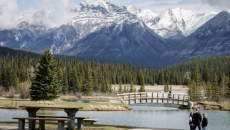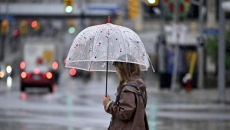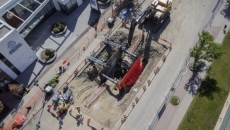Oil and gas producers in Canada will be required to cut greenhouse gas emissions by about one-third over the next eight years under new regulations being published today by Environment Minister Steven Guilbeault.
The regulations, still only in draft format and about two years behind schedule, could further strain relations between Ottawa and the Alberta government which recently launched a $7-million advertising campaign to "scrap the cap."
For the Liberals, the regulations fulfil a 2021 election promise to force the energy sector to pull its weight in the fight against climate change.
"I think everyone should do their fair share," Guilbeault said in an interview with The Canadian Press ahead of a news conference in Ottawa on Monday with Natural Resources Minister Jonathan Wilkinson to outline more details of the plan.
Guilbeault said the oil and gas industry is a major source of emissions, but that it has done less than most other sectors to reduce them in the battle against climate change.
"I think most Canadians — even those that aren't my biggest fans — would agree that it's not OK for a sector to not be doing its share, and that's mostly what this regulation is about."
Upstream oil and gas operations, including production and refining, contributed about 31 per cent of Canada's total emissions in 2022.
The regulations propose to force emissions from upstream oil and gas operations to fall to 35 per cent less than they were in 2019 sometime between 2030 and 2032.
Emissions from the sector already fell seven per cent between 2019 and 2022 — the most recent year that statistics are available — with similar levels of production.
Guilbeault said he is aware there will be backlash, but that he is committed to carrying out the Liberal climate goals. The government is also adamant that the regulations can be achieved with existing technology, without cutting production.
Guilbeault said federal modelling shows even with the regulations oil and gas production will still rise 16 per cent by 2032, compared with 2019.
Guilbeault said reducing emissions from Canada's oilpatch is the only way Canadian oil will remain competitive in a world that is increasingly looking for the greenest option available.
"In a carbon-constrained world, people who will still be demanding oil will be demanding low-emitting oil," he said. "And if our companies and our oil and gas sector isn't making the investments necessary to do that, they won't be able to compete in this world."
The cap does not dictate what companies must do to meet the target, but Guilbeault said the modelling suggests about half the cuts will come from reductions to methane. Those cuts are already happening as oil producers install equipment to prevent the leaks of methane that were a major contributing source of emissions.
The rest will be divided between various technologies, including carbon capture and storage. Ottawa is expected to spend about $12.5 billion on a tax credit to encourage and assist companies to invest in those systems that trap carbon dioxide and return it to underground storage.
The broad strokes of the policy were outlined nearly a year ago when Guilbeault published a "framework" for the plan that promised to force emissions from upstream oil and gas production downward until they were between 35 and 38 per cent lower in 2030 than in 2019.
The draft regulations, which will be open for public comment until January 2025, ultimately picked the lower end of that range. Guilbeault said that was decided after extensive discussions about what was possible to regulate without forcing down production.
Production is likely to be central to the debate as regulations are released Monday. Several economic studies based on the framework plan from December 2023 said the only way to meet goals is through production cuts.
The Conference Board of Canada said in March that overall output of oil and gas would grow about 14 per cent without an emissions cap and 1.6 per cent with them. It predicted government revenues, particularly in Alberta, would be much smaller as a result of them.
It also projected that employment growth would be slower, with a bigger impact in Alberta.
Goldy Hyder, President of the Business Council of Canada, said in a statement ahead of the emissions regulations that imposing a cap is the wrong move for the country.
Hyder said the cap will harm the economy, restrict cross-border energy trade with the United States, and make climate policy "even more incoherent and uncompetitive."
Alberta Premier Danielle Smith has promised to fight an emissions cap, saying it would deal a 'devastating blow" to her province's economy and to jobs.
On the weekend, members of Smith's governing United Conservative Party voted heavily in favour of a resolution to abandon the province's plans to cut emissions and declare carbon dioxide to be essential, not a pollutant.
Conservative Leader Pierre Poilievre has also vowed to rip up emissions cap regulations.
The regulations won't be finalized for months. and it's possible that the next federal election will take place before they are actually in force.
For Guilbeault, getting them out the door in a battle against climate change that he says has become so politically charged even progressives are wobbling, feels like something to celebrate.
"In this day and age, where climate change has become caught in this culture war that we're seeing in many parts of the world to be able to continue advancing progressive policies to fight climate change is in and of itself a big victory," he said.






